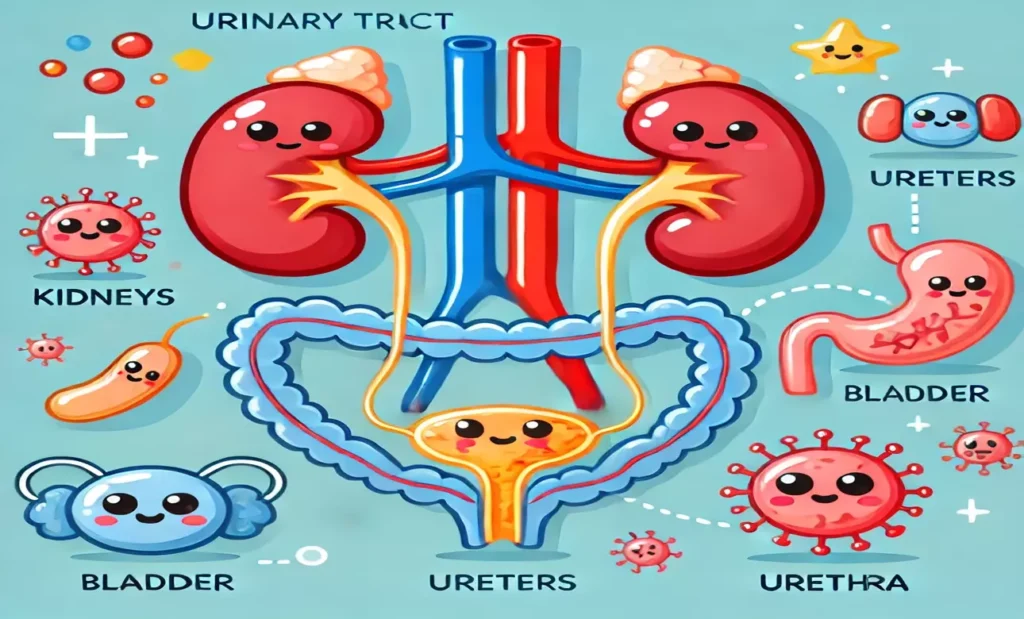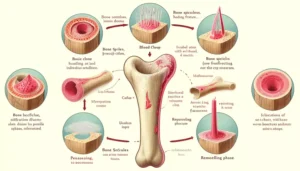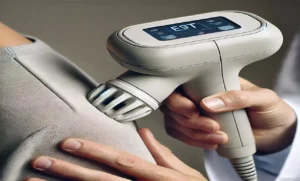Urgent Care for UTIs: Your Guide to Quick Relief and Recovery

Have you ever experienced that unmistakable burning sensation when you pee? Or you’ve found yourself rushing to the bathroom every few minutes, only to produce a trickle. If these scenarios sound familiar, you might be dealing with a urinary tract infection (UTI). Don’t worry, you’re in good company. UTIs are incredibly common, especially among women. But here’s the silver lining: urgent care centres are ready and equipped to be your go-to solution when those pesky bacteria throw a party in your urinary tract.
Let’s explore the world of UTIs and discover how urgent care for UTIs can be your knight in shining armour, providing swift relief when you need it most.
- What is an Urinary Tract Infection (UTI)?
- Common Symptoms of UTIs
- Causes and Risk Factors
- Why Choose Urgent Care for UTIs Treatment?
- The Urgent Care Process for UTIs
- When You Should Seek Urgent Care for a UTI
- What to Expect During Your Medical Evaluation for a UTI
- At-Home Care Tips for UTIs
- Prevention Strategies for Future UTIs
- Follow-Up Care After Urgent Care Treatment
- Home Remedies for Urinary Tract Infections (UTIs)
- Conclusion: The Importance of Timely UTI Treatment
- FAQs About Urgent Care for UTIs
What is an Urinary Tract Infection (UTI)?
Imagine your urinary tract as a complex water park. Usually, it’s all fun and games, with everything flowing smoothly. Nevertheless, unwanted visitors (such as bacteria) occasionally infiltrate and create disorder. The bottom line is that it is a urinary tract infection (UTI). The term itself translates incompetently as the problem is the troublesome bacteria invasion in the urinary system consisting of the kidneys, ureters, bladder, and urethra.
Common Symptoms of UTIs
How do you know if you’ve got unwanted visitors in your urinary tract? Beware of the following unmistakable risks:
- A burning sensation when you pee (as if your urethra suddenly decided to cosplay as a dragon)
- Feeling like you need to pee all the time (even your bladder feeling as though it’s empty)
- Cloudy or strong-smelling urine (not pleasant, but essential to notice)
- Pelvic pain (especially for the ladies)
- Feeling tired or shaky (like you’ve run a marathon, but you’ve just been to the bathroom)
- Fever or chills (in more severe cases)
Causes and Risk Factors
UTIs don’t discriminate, but some folks are more likely to host these bacterial parties. Women are the VIP guests due to their shorter urethras – it’s like giving bacteria a shorter obstacle course to run. Other factors that roll out the red carpet for UTIs include:
- Sexual activity (bacteria are excellent hitchhikers)
- Menopause (hormonal changes can affect your urinary tract’s defences)
- Certain types of birth control, particularly those containing spermicide
- Poor hygiene practices are wrong even in a post-intimate act e.g. ‘always wipe from front to back’.
- Holding your pee for too long (your bladder isn’t a storage unit.)
- Diabetes (when blood sugar levels are high, bacteria will thrive)
- Pregnancy (the growing uterus can block the drainage of urine)
Why Choose Urgent Care for UTIs Treatment?
Picture this: It’s Saturday night, you’re feeling miserable, and your regular doctor’s office is closed. Enter urgent care – your UTI’s worst nightmare.
Convenience and Accessibility
Urgent care centres are like convenience stores in healthcare. They’re often open late and on weekends, perfect for when UTIs strike at the most inconvenient times. For non-life-threatening situations, there is no need to wait until Monday morning or resort to the emergency room.
Cost-Effectiveness
In general, an urgent care visit will be cheaper than an emergency department visit. It’s like choosing a cosy bed and breakfast over a five-star hotel – you still get excellent service without breaking the bank. Many urgent care centres also accept various insurance plans, making them a financially savvy choice.
Faster Treatment Times
Urgent care centres are designed for, well, urgent matters. You’ll likely be in and out faster than you can say “urinary tract infection” ten times fast. This quick turnaround means you can start treatment sooner, potentially preventing the infection from worsening.
The Urgent Care Process for UTIs
So, you’ve decided to visit urgent care. What can you expect? Let’s examine this process systematically, addressing each component individually.
Initial Assessment
Your healthcare provider will ask some questions to inquire about your symptoms. Be honest – this isn’t the time to be shy about your pee problems. They might ask questions like:
- When did your symptoms start?
- Have you had UTIs before?
- Are you sexually active?
- Do you have any other medical conditions?
Diagnostic Tests
You’ll need to provide a urine sample. Think of it as your bladder’s chance to snitch on the bacteria. The sample will undergo a urinalysis, which can detect:
- White blood cells (a sign of infection)
- Red blood cells (which may indicate kidney involvement)
- Nitrites (produced by some bacteria)
- Leukocyte esterase (this is an enzyme that indicates the presence of leukocytes)
Sometimes it may be necessary to take a urine test in order to identify the bacteria causing the infection and find the most effective antibiotic treatment.
Treatment Options
Most urinary tract infections are treated with antibiotics. Tiny soldiers are marching in to kick those bacteria out of your urinary tract. Common antibiotics for UTIs include:
- Nitrofurantoin (Macrobid)
- Trimethoprim/sulfamethoxazole (Bactrim)
- Fosfomycin (Monurol)
- Ciprofloxacin (Cipro)
Your healthcare professional may select appropriate antibiotics depending on various factors, including the severity of your specific infection, medical history, and local antibiotic resistance patterns.
When You Should Seek Urgent Care for a UTI
Not all UTIs require an immediate dash to urgent care. But sometimes, your body sends out an SOS that shouldn’t be ignored.
Recognizing Severe Symptoms
If you’re experiencing any of the following symptoms, it’s time to seek assistance:
- High fever (over 101°F or 38.3°C)
- Severe pain in your back or side
- Nausea and vomiting
- Blood in your urine
- Signs lasting over a week
These symptoms may suggest that the infection has progressed to your kidneys, a more serious condition requiring prompt attention.
Complications of Untreated UTIs
A urinary tract infection can progress to its advanced stage leading to a kidney infection if no treatment is received. Trust me, you don’t want that party in your renal system. It’s like letting a small kitchen fire spread to the whole house. Kidney infections can lead to:
- Permanent kidney damage
- Sepsis (a life-threatening response to infection)
- Pregnancy complications (for expectant mothers)
What to Expect During Your Medical Evaluation for a UTI
Walking into urgent care can feel intimidating, but remember, they’re there to help you feel better.
Consultation with a Healthcare Provider
You’ll chat with a medical professional about your symptoms. They’re like detectives, piecing together clues to solve the mystery of your UTI. Don’t hold back – the more information you provide, the better they can help you.
Urinalysis and Other Tests
It’s time to pee in a cup. Urinalysis is like CSI for your urine, revealing important clues about what’s going on in your urinary tract. The results are usually available within minutes, allowing for quick diagnosis and treatment.
Prescription of Antibiotics
If tests confirm a UTI, you’ll be prescribed antibiotics. These are your bladder’s bouncers, kicking out the unwanted bacterial guests. The healthcare provider will explain:
- How to take the medication
- Potential side effects
- Why is the importance of completing the full course of antibiotics emphasized?
At-Home Care Tips for UTIs
While antibiotics do the heavy lifting, there are things you can do at home to support your recovery and ease discomfort.
Hydration and Diet
Drink water like it’s your job. It helps flush out bacteria. Ensure to consume at least eight glasses of water every day. Cranberry juice can help prevent UTIs by making it harder for bacteria to stick to the bladder wall; it’s not just a myth. Just opt for unsweetened varieties to avoid excess sugar.
Pain Management
Over-the-counter pain relievers can help with discomfort. Think of them as your urinary tract’s masseuse. Options include:
- Ibuprofen (Advil, Motrin)
- Acetaminophen (Tylenol)
- Phenazopyridine (AZO, for urinary pain relief)
Lifestyle Adjustments
Avoid irritants like alcohol, caffeine, and spicy foods. Your bladder needs a vacation from these troublemakers. Also, wear loose-fitting, breathable clothing to keep the area dry and less hospitable to bacteria.
Prevention Strategies for Future UTIs
Let’s talk about keeping those bacteria at bay in the future. Prevention is always better than cure.
Proper Hygiene Practices
Always wipe from front to back, ladies. And gentlemen, keep things clean down there too. After sexual activity, both partners should urinate to help flush out any bacteria that might have entered the urethra.
Dietary Considerations
Stay well-hydrated and consider incorporating probiotics into your diet. They’re like bouncers for your urinary tract, helping to keep the bad guys out. Foods rich in vitamin C can also help by making your urine more acidic and less friendly to bacteria.
Lifestyle Changes
- Pee after sex (it’s not romantic, but it’s effective)
- Don’t hold your urine for long periods
- Consider switching birth control methods if you’re prone to UTIs
- Do not use scented products in the genital area.
Follow-Up Care After Urgent Care Treatment
Once you have been to the urgent care facility, please:
- Always complete all the doses of the antibiotics, regardless of how well you feel
- Drink plenty of water
- If your symptoms persist, following up with your regular doctor is important.
Let us assume that you have multiple episodes of infection in the urinary tract (3 times or more over the period of 1 year). In that case, seeing a urologist or urogynecologist for a more comprehensive evaluation is essential.
Home Remedies for Urinary Tract Infections (UTIs)
Here are some effective home remedies for urinary tract infections (UTIs):
Stay Hydrated
Staying hydrated by drinking sufficient water, around 8-10 glasses per day, can help flush out bacteria from the urinary system. Additionally, consuming unsweetened cranberry juice may prevent bacteria from attaching to the urinary tract walls.
Use Heat
Apply a heating pad or a warm compress to your lower abdomen can help soothe the pain and discomfort associated with UTIs.
Take Probiotics
Consuming probiotic foods such as yogurt or taking probiotic supplements can help rebalance the good bacteria in your urinary tract and combat infection.
Try Vitamin C
Increasing your intake of vitamin C, whether from food or supplements, can make your urine more acidic, which may help reduce bacterial growth.
Practice Good Hygiene
Wipe from front to back after using the bathroom, urinate after sexual intercourse, and avoid holding your urine for long periods.
Avoid Irritants
Stay away from caffeine, alcohol, spicy foods, nicotine, carbonated drinks, and artificial sweeteners, which can irritate your bladder.
Wear Loose Cotton Clothing
It does improve ventilation and assists in moisture control within the genitourinary region.
Try Herbal Remedies
Some herbs like uva ursi, goldenseal, and Oregon grape root have antibacterial properties that may help fight UTIs. However, you should see a doctor before practising any natural remedies.
Empty your Bladder Frequently
Urinate as soon as you feel the need to go, and try to empty your bladder completely each time.
Consider D-mannose
This natural compound may assist in preventing some bacteria to stick to walls of the urinary tract.
While these home-based approaches can potentially help manage symptoms and reduce the likelihood of recurrence, it’s crucial to recognize that UTIs frequently necessitate antibiotic treatment. If symptoms continue or further worsen, it’s advisable to promptly consult a healthcare professional.
Conclusion: The Importance of Timely UTI Treatment
UTIs might be expected, but they’re something to pay attention to. Urgent care centres provide a fantastic, quick, effective treatment option, bridging the gap between your regular doctor’s office and the emergency room. Remember, taking care of your urinary health is essential – your bladder will thank you. By understanding the symptoms, seeking prompt treatment, and following prevention strategies, you can minimize the impact of UTIs on your life. Don’t let these bacterial invaders hold your bladder hostage – with urgent care for UTIs and proper self-care; you can reclaim control and keep your urinary tract happy and healthy.
FAQs About Urgent Care for UTIs
Can I get UTI treatment at urgent care without an appointment?
Yes, most urgent care centres accept walk-ins for UTI treatment. However, some may offer the option to book online to reduce wait times.
How long does a typical urgent care visit for a UTI take?
Usually, it is between 30 minutes and an hour, depending on how busy the centre is and the complexity of your case.
Will urgent care prescribe antibiotics for my UTI?
If tests confirm a UTI, doctors typically prescribe antibiotics. The nature and length of the antibiotics will vary according to your circumstances.
Are men susceptible to a urinary tract infection, and are they able to visit urgent care?
Although less common, men can get UTIs and be treated at urgent care. Men with UTI symptoms should always seek medical attention as it may indicate other underlying conditions.
How long should I expect an improvement in my condition after taking antibiotics?
Many people start feeling better within 1-2 days but always complete the entire course of antibiotics to ensure the infection is fully cleared.
Can urgent care treat recurring UTIs?
Yes, but they may refer you to a specialist for chronic issues. If you have frequent UTIs, following up with a urologist or primary care physician is essential.
Is urgent care more expensive than seeing my regular doctor for a UTI?
It’s often comparable or slightly more expensive, but usually less than an ER visit. The exact cost can fluctuate based on your insurance coverage and the particular urgent care facility.
Can I get tested for STIs at the urgent care if I’m unsure whether it’s a UTI?
Many urgent care centres offer STI testing, but it’s best to call ahead and confirm. Some symptoms can overlap and may be indistinguishable between the UTIs and certain STIs.
What if urgent care is closed when I need UTI treatment?
If you have significant symptoms, please seek follow-up care in the Emergency room. Otherwise, try over-the-counter pain relievers and drink plenty of water until you can seek treatment. Some areas also have 24-hour urgent care facilities.
Can urgent care treat UTIs in pregnant women?
Yes, but inform the provider that you’re pregnant, as it may affect treatment options. Pregnant women with UTIs need prompt treatment to prevent complications.






